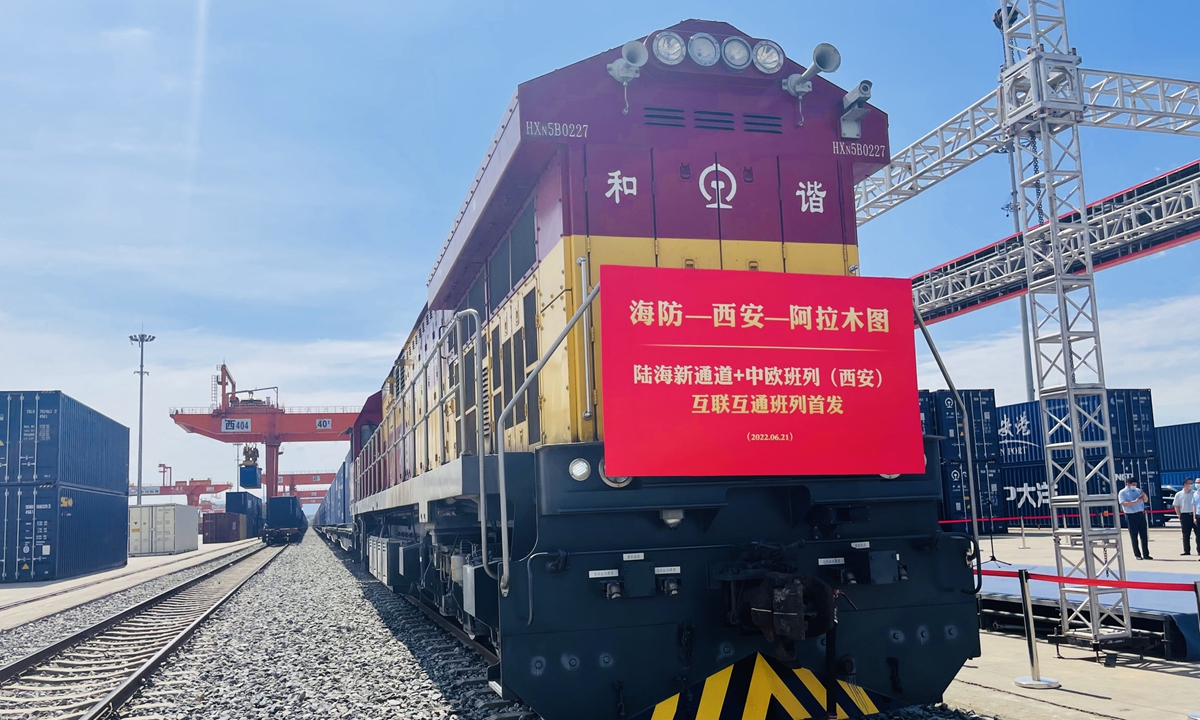China, Kazakhstan building third border railway: Kazakh envoy
Closer connectivity to boost trade with Central Asia, Europe: expert

The China-Europe train heads to Kazakhstan Photo:cnsphoto
China and Kazakhstan are building a third railway on the border between the two countries due to an increased demand for rail transport, Kazakhstan's Ambassador to China Shakhrat Nuryshev said during a recent forum in Beijing, in another sign of growing connectivity between the two neighbors that could help further boost trade between China and the broader Central Asia region and beyond.
Attending the recently concluded 10th World Peace Forum in Beijing, Nuryshev said Kazakhstan and China are building a third railway on the border, adding that the construction of the China-Kyrgyzstan-Uzbekistan (CKU) railway will be beneficial to all countries, according to the Beijing Daily newspaper.
Nuryshev made the announcement while answering questions about the construction of the CKU, which he said is beneficial especially at a time when the demand for railway transportation is increasing, the Beijing Daily reported.
The construction of the Central Asian railway network will not only help boost China-Central Asia cooperation and the local economies but will also add resilience to China-Europe trade links via the cross-continental rail link, Chinese experts noted.
The opening of the new route could ease the burden on road transport and meet the increasing demand for China-Europe and China-Central Asia trade, Li Xin, director of the Institute for Eurasian Studies at the Shanghai University of Political Science and Law, told the Global Times on Wednesday.
For Kazakhstan, the third China-Kazakhstan cross border railway will also help the Central Asian country play a more prominent role as a logistical transmission center along the China-Europe freight train network, bringing economic benefits and employment opportunities to the country, Li noted.
Kazakhstan is an important node for China-Europe freight trains. In 2019, more than 90 percent of China-Europe freight trains passed through Kazakhstan from the West line, according to a report on the official website of the Chinese Commerce Ministry.
Amid the impact of the COVID-19 pandemic, there is a strong demand for China-Europe freight trains. In 2021, a total of 1.46 million TEUs of goods were transported by China-Europe freight trains. In the first five months of this year, 6,157 China-Europe freight trains were operated, up 3 percent year-on-year, according to data from China's National Development and Reform Commission (NDRC).
The CKU railway, which has been in the planning phase for two decades, has finally received a significant boost.
In a recent development, officials from the NDRC and transport ministry of Kyrgyzstan and Uzbekistan jointly hosted a trilateral working level video conference on the CKU last month, and the officials have exchanged in-depth views on promoting cooperation on the railway project, according to the NDRC's website on June 6.
The planned CKU route will become the southern part of the New Eurasian Continental Bridge and form a convenient transport corridor linking East and Southeast Asia to Central and West Asia, North Africa and Southern Europe, the Xinhua News Agency reported.
According to the plan, the total length of the CKU railway is about 523 kilometers, including 213 kilometers in China, 260 kilometers in Kyrgyzstan and about 50 kilometers in Uzbekistan, according to Xinhua. When completed, the railway will be the shortest route for transporting goods from China to Europe and the Middle East, cutting the freight journey by 900 kilometers and saving seven to eight days in travel time, Xinhua reported.
Once the CKU is completed, it will benefit Central Asia's own economic development and enhance the resilience and connectivity of China-EU trade, Cui Hongjian, director of the Department of European Studies at the China Institute of International Studies, told the Global Times on Wednesday.
For Central Asian countries, the new network will further develop their transit potential, and drive their industrial and economic development as a transportation hub between China and Europe, Cui said.
The project can also boost the resilience of trade between China and the EU. For example, both sides could carry out industrial or third-party cooperation in countries along the route to increase the resilience and vitality of China-Europe trade, Cui said.
In the first five months of 2022, the EU became China's second biggest trading partner, as trade between China and the EU surged 7 percent year-on-year to 2.2 trillion yuan ($328 billion), according to data from Chinese Customs.
"In addition to solving some bilateral trade problems, China and the EU could strengthen cooperation on the Eurasian passage to add resilience to their trade ties," Cui added.

